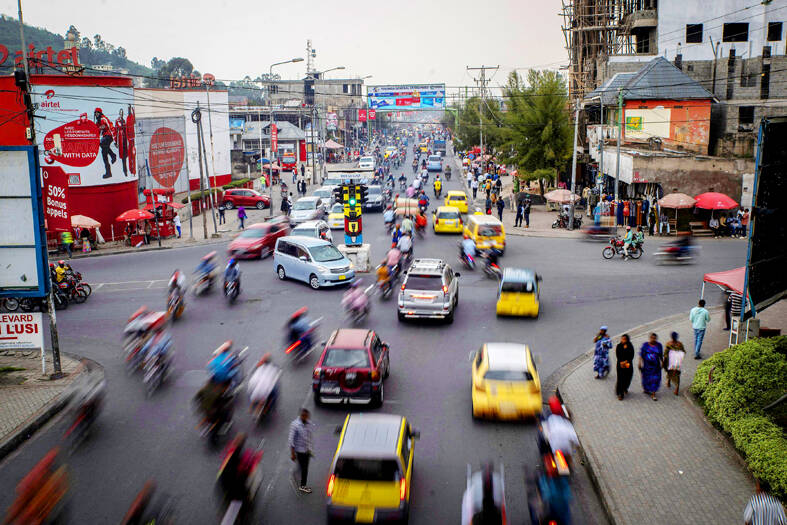Despite the two major cities in the eastern Democratic Republic of the Congo falling into the hands of the M23 militia, some residents are celebrating their newfound fortunes — amassed through cryptocurrency trading. Crypto trading is seemingly an answer to the economic crisis plaguing the region, where banks have been ordered closed by Kinshasa authorities to prevent the funding of the Rwanda-backed rebels, but it often conceals well-organized scams exploiting the already-struggling population.
“With US$1,000 in investments, I earn between US$672 and US$700 each month,” boasted John, a civil servant and artist, sitting under a parasol on the popular “beer avenue” in Bukavu.
“My first investment was US$800, after 30 days I withdrew US$480 and left US$1,000 in my account. Currently, I easily reach US$2,000, US$4,000, which allows me to advance my businesses, my projects and repay my debts,” he said while sipping an imported beer, the only option since the local brewery shut down due to the fighting.

Photo: Reuters
The only condition, he said, is to connect several times a day and refer other people to join the obscure online trading platform, which claims to be a foundation established in the US. It resembles a pyramid scheme, whose profits rely entirely on recruiting new members. In the central African country ranked among the poorest in the world ravaged by decades of conflict, online scams have found fertile ground, said Justin Murhula, a digital security trainer in Bukavu.
“Many people, in search of easy gains given the current state of vulnerability, get carried away,” he said.
Kinshasa inked an agreement with the M23 for a permanent ceasefire in Doha in July, after the DR Congo and Rwanda signed a US-brokered deal aimed at ending the conflict in June, but have yet to stop the violence, let alone reopen banks or bring economic relief.
The M23, which has taken the two large eastern cities of Goma and Bukavu, has imposed several taxes to finance its parallel administration.
With police stations and courts abandoned since the militant group’s arrival, there is no mechanism or authority to combat scams.
From phishing to fake messages from relatives or international organizations, online scams have proliferated in the DR Congo and its neighbors since before the resurgence of the M23, with several Ponzi schemes resulting in bankruptcies.
“In 2018, I fell victim to scammers. The idea was to deposit an amount equal or greater to US$200 and earn monthly interest through an online system where you could see how it accumulated,” said Justin, who declined to provide his full name.
He lost everything a month later, he said: “The system was blocked.”
Bukavu lawyer Pascal Mupenda said he is constantly solicited by similar platforms.
“They managed to convince three of my colleagues,” he sighed.
In a country where about 73 percent of the population lives on less than US$2 a day, for some, the opportunity to try their luck outweighs the risks.

Nissan Motor Co has agreed to sell its global headquarters in Yokohama for ¥97 billion (US$630 million) to a group sponsored by Taiwanese autoparts maker Minth Group (敏實集團), as the struggling automaker seeks to shore up its financial position. The acquisition is led by a special purchase company managed by KJR Management Ltd, a Japanese real-estate unit of private equity giant KKR & Co, people familiar with the matter said. KJR said it would act as asset manager together with Mizuho Real Estate Management Co. Nissan is undergoing a broad cost-cutting campaign by eliminating jobs and shuttering plants as it grapples

TEMPORARY TRUCE: China has made concessions to ease rare earth trade controls, among others, while Washington holds fire on a 100% tariff on all Chinese goods China is effectively suspending implementation of additional export controls on rare earth metals and terminating investigations targeting US companies in the semiconductor supply chain, the White House announced. The White House on Saturday issued a fact sheet outlining some details of the trade pact agreed to earlier in the week by US President Donald Trump and Chinese President Xi Jinping (習近平) that aimed to ease tensions between the world’s two largest economies. Under the deal, China is to issue general licenses valid for exports of rare earths, gallium, germanium, antimony and graphite “for the benefit of US end users and their suppliers

Dutch chipmaker Nexperia BV’s China unit yesterday said that it had established sufficient inventories of finished goods and works-in-progress, and that its supply chain remained secure and stable after its parent halted wafer supplies. The Dutch company suspended supplies of wafers to its Chinese assembly plant a week ago, calling it “a direct consequence of the local management’s recent failure to comply with the agreed contractual payment terms,” Reuters reported on Friday last week. Its China unit called Nexperia’s suspension “unilateral” and “extremely irresponsible,” adding that the Dutch parent’s claim about contractual payment was “misleading and highly deceptive,” according to a statement

The Chinese government has issued guidance requiring new data center projects that have received any state funds to only use domestically made artificial intelligence (AI) chips, two sources familiar with the matter told Reuters. In recent weeks, Chinese regulatory authorities have ordered such data centers that are less than 30 percent complete to remove all installed foreign chips, or cancel plans to purchase them, while projects in a more advanced stage would be decided on a case-by-case basis, the sources said. The move could represent one of China’s most aggressive steps yet to eliminate foreign technology from its critical infrastructure amid a